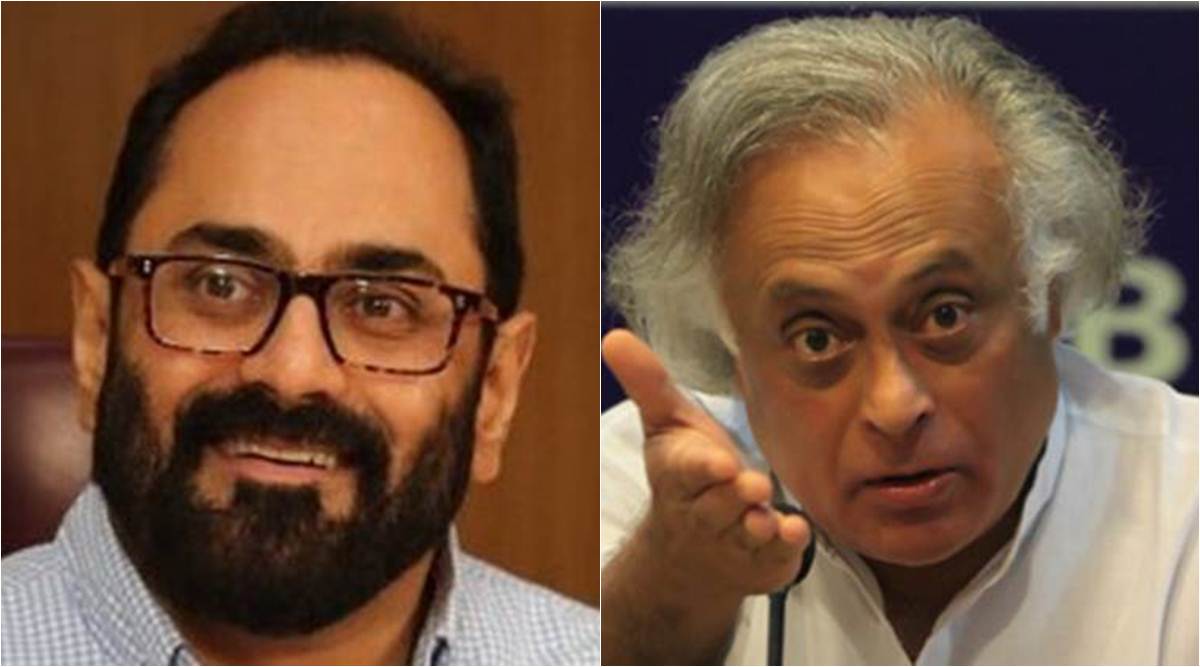Minister, MPs attend Tibet event, China diplomat writes to them: Don’t support

A week after a group of Parliamentarians, including Union MoS Rajeev Chandrasekhar, attended a dinner reception hosted by the Tibetan Parliament-in-exile, the Chinese Embassy in Delhi has expressed “concern” over their participation and asked them to “refrain from providing support to the ‘Tibetan independence’ forces”.
Under the All-Party Indian Parliamentary Forum for Tibet, at least six MPs cutting across party lines had attended an event on December 22 at a hotel in Delhi. They included Union MoS for Entrepreneurship, Skill Development, Electronics & Technology Rajeev Chandrasekhar, BJP’s Maneka Gandhi and K C Ramamurthy, Congress MPs Jairam Ramesh and Manish Tewari, and BJD’s Sujeet Kumar. The Speaker of Tibetan Parliament-in-exile, Khenpo Sonam Tenphel, was also present.
China’s unusually worded letter, sent Thursday by the Political Counsellor at its Embassy, is being seen as an undiplomatic move by Delhi, as foreign diplomats writing to MPs in India in this manner has not happened in the recent past.
Reacting sharply to the letter, BJD’s Kumar said: “Who is the Political Counsellor at the Chinese Embassy to write to a Member of Parliament of India, the largest democracy? How dare you send letters to Indian MPs? If anything, you can raise your protest through official channels. I think the MEA (Ministry of External Affairs) should take a stand.”
The letter comes almost four years after the Government had asked “senior leaders” and “government functionaries” to not attend the events organised by Tibetans in India, citing bilateral ties.
In the letter, Political Counsellor Zhou Yongsheng wrote: “I have noticed that you have attended an activity held by the so-called “All-Party Indian Parliamentary Forum for Tibet” and interacted with some members of so called “Tibetan Parliament in Exile”. I would like to express our concern on that.”
The Counsellor wrote: “As is known to all, the so-called ‘Tibetan Government in-exile’ is an out-and-out separatist political group and an illegal organization completely in violation of China’s Constitution and laws. It is not recognized by any country in the world. Tibet has been an inseparable part of China since ancient times, and Tibet related affairs are purely China’s internal affairs that allow no foreign interference.”
The letter stated that in a series of political documents, the Indian Government has recognised that the Tibet Autonomous Region is part of the territory of the People’s Republic of China and reiterated that it does not allow Tibetans to carry out anti-China political activities.
“China firmly opposes any anti-China separatist activities conducted by “Tibetan independence” forces in any capacity or name in any country and opposes any forms of contact by officials of any country with them,” the letter said.
Addressing the MPs, Zhou wrote: “You are a senior politician who know the China-India relations well. It is hoped that you could understand the sensitivity of the issue and refrain from providing support to the “Tibetan independence” forces, and make contributions to China-India bilateral relations.”
When contacted, Chandrasekhar told The Indian Express: “I was a member of the Indo-Tibetan Parliamentary forum under the chairmanship of (BJP veteran) Shanta Kumarji and I was invited in the capacity. I attended the dinner.”
BJD’s Kumar, who is also convenor of the forum, said: “Personally speaking, I don’t consider Tibet to be a part of China. That is separate because the Government of India’s official policy is different. But this Parliamentary forum on Tibet is to support the cause of Tibetan cultural and religious beliefs, and is between the people of India and the Tibetan government-in-exile. One should not read too much politics into it.”
Kumar said: “The stated goals of the Parliamentary forum is not to advocate for the independence of Tibet or anything controversial. It is largely to build a relationship between the government-in-exile and the people of India because of the shared history, shared civilization and linkages..because of Buddhism, because of trade between Tibet and India in the past. The idea is to build on those linkages. I think I have already received four or five letters from the Embassy. I give them befitting replies, too,” he said.
When contacted, Congress’ Jairam Ramesh confirmed that he has received a letter from the Political Counsellor. “When I was asked to speak (at the event), I said I never go to any evening functions but I have made an exception because of my profound admiration for the Buddha, deep respect for the Dalai Lama and in gratitude for the role Tibetan sources have played in the rediscovery of India’s Buddhist heritage.”
India has had a consistently supportive policy towards the exiled leaders of Tibet. In a careful balancing act on its pledged support to Tibetans while seeking a peaceful relationship with China, India’s position has been to recognise Tibet as an autonomous region of the People’s Republic of China. It “continues to seek a fair, reasonable and mutually acceptable solution to the vexed boundary issue” with China.
Sixty years ago, around 80,000 Tibetans, along with their spiritual leader the Dalai Lama, left Lhasa after a failed uprising against the Communist rule and arrived in India.
The Tibetan exile administration, called CTA, is based in Dharamshala where the spiritual leader also lives. Around 140,000 Tibetans now live in exile, over 100,000 of them in different parts of India. Over six million Tibetans live in Tibet.
In 2018, the Centre had advised senior ministers and bureaucrats to stay away from ‘Thank You India’ events organised by Tibetan leaders.
The Indian Express had reported on an official note dated February 22, 2018, advising “senior leaders” and “government functionaries” of the Centre and states to stay away from events organised by Tibetan leaders, citing “very sensitive times” in bilateral relations on India and China.
The note was sent by then Foreign Secretary Vijay Gokhale to Cabinet Secretary at the time, P K Sinha, who issued a directive two days later.

“평생 사상가. 웹 광신자. 좀비 중독자. 커뮤니케이터. 창조자. 프리랜서 여행 애호가.”
